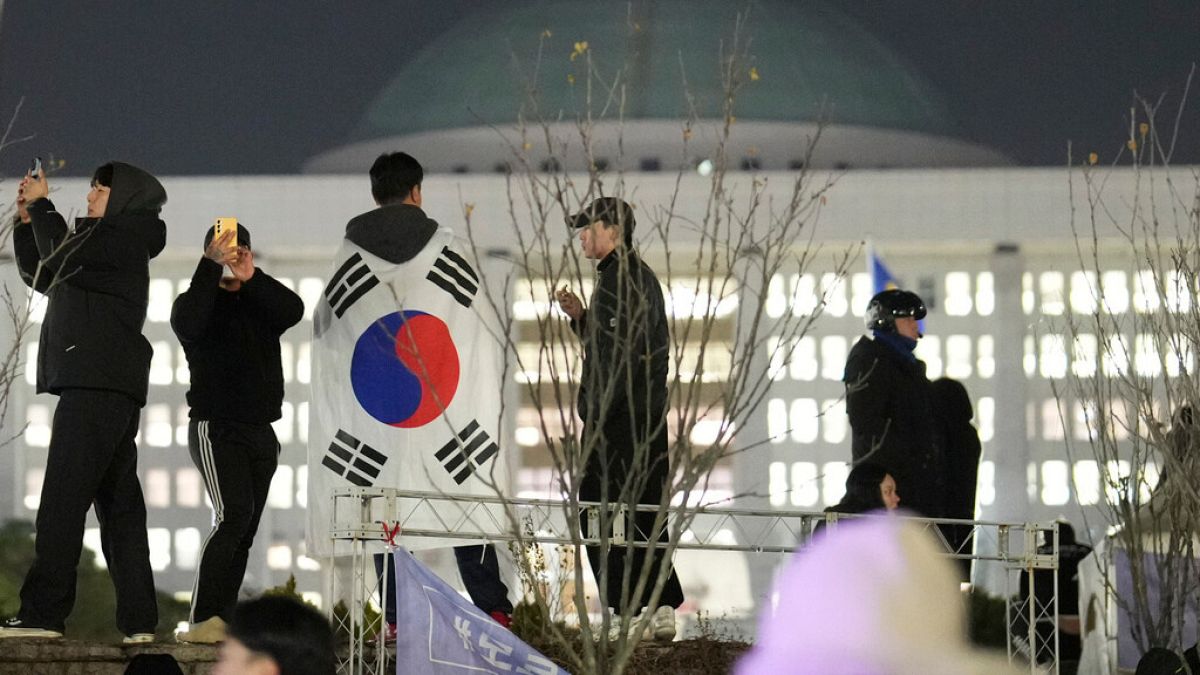Moldova’s EU dream hangs in balance after shock referendum result
President Maia Sandu blamed "criminal groups, working together with foreign forces" for apparent defeat in nationwide vote on EU membership.
Moldova’s plans to join the European Union were cast into doubt Sunday after a majority of voters appeared to reject membership in a national referendum that the country’s president said was skewed by “unprecedented” Russian interference.
According to figures published by Moldova’s electoral commission in the early hours of Monday, 51.3 percent of voters from the Eastern European nation cast their ballots against a plan by pro-Western President Maia Sandu to join the EU by 2030, compared to 48.7 percent who supported it with 96 percent of ballots counted.
Speaking at an emergency press conference as the vote count passed 90 percent, Sandu alleged that “criminal groups, working together with foreign forces” had deployed “tens of millions of euros, lies and propaganda” in a bid to keep Moldova “trapped in uncertainty and instability.”
The country’s authorities, she said, had “clear evidence” of “fraud on an unprecedented scale” designed to undermine the democratic process. “We are waiting for the final results, and we will respond with firm decisions.”
As the ballot tally neared completion, campaign insiders warned that diaspora voters living abroad in the EU were yet to be included in the count. However, two officials with knowledge of the process spoke of increasing concern the pro-EU campaign had failed.
More than 1.5 million people, or 51 percent of the electorate, cast ballots in the nationwide referendum — well above the one-third required to be considered valid. The plebiscite could shape Moldova’s geopolitical future for years to come.
In a simultaneous presidential election, Sandu, who is seeking a second term in office, topped the list of candidates with `37 percent of the vote after 90 percent of ballots were counted. Her closest rival, pro-Kremlin Socialist Party politician Alexandr Stoianoglo, was second with 29 percent.
Having apparently failed to secure an outright majority, Sandu now faces Stoianoglo in a second round — an embarrassing prospect for the incumbent, who had been expected to win by a large margin.
Speaking to POLITICO earlier this week, Moldova’s Deputy Prime Minister and EU integration chief, Cristina Gherasimov, said the government viewed EU membership as “existential” given the threats from Moscow. “There is no plan B” to winning the referendum, she added.
“The expectation was that there would be a dramatic victory for the incumbent president,” said Vlad Lupan, Moldova’s former ambassador to the United Nations, early Monday after more than 90 percent of the referendum votes had been counted.
“The opinion polls in the Republic of Moldova are notoriously unreliable, with an extremely high margin of error, and that will be one of the explanations for today,” Lupan said. “The other is a scheme to buy voters by pro-Russian actors. Moldova is a relatively poor country and a number of people who would have voted one way were definitely targeted, particularly those with lower incomes.”
Victory for Russia?
Moldova has undergone a rapid pivot toward the West in recent years, with the war in Ukraine raging just across the border. Officials warned that Russian intelligence had made active attempts to disrupt the EU membership referendum, as well as the simultaneous election in which President Sandu sought a second term.
“We are seeing the classic hybrid toolbox Russia uses to influence elections, but the magnitude is really unprecedented,” Gherasimov said. “We see hybrid attacks on public institutions responsible for critical services like the post office and the airport. We see vote-buying. We see the use of local corrupt proxies and political parties — they’re given cash to destabilize the situation on the ground.”
In September, Moldova’s national security adviser Stanislav Secrieru told POLITICO the country faced an “unprecedented onslaught” of hybrid tactics.

The country’s chief of police later alleged that more than $15 million in Russian funds had been funneled into the bank accounts of more than 130,000 Moldovan citizens in the lead-up to the elections as part of an apparent vote-buying scheme.
The EU dispatched a civilian mission to Moldova to help build resilience against threats from Russia, with Ukrainian security forces warning they had detected a plot to oust Sandu.
Earlier on Sunday, footage emerged of large crowds forming at two overseas polling stations in Russia, with Moldovan officials warning they had “been artificially created to jeopardize the electoral process.”
“Russian President Vladimir Putin has been using Moldova as a proxy to show that the West is a paper tiger and Brussels is not a reliable ally,” said Ivana Stradner, a research fellow at Washington’s Foundation for Defense of Democracies. The apparent success of Russian hybrid warfare, she said, proved a worrying omen for next week’s critical elections in Georgia — another EU candidate country where Moscow is seeking to strengthen its hand.
“Georgia is watching Moldova and if the West fails in Chișinău, Tbilisi is next,” Stradner said.
This is a developing story and has been updated with new voting data and additional quotes.
Hanne Cokelaere contributed reporting.
What's Your Reaction?


















































